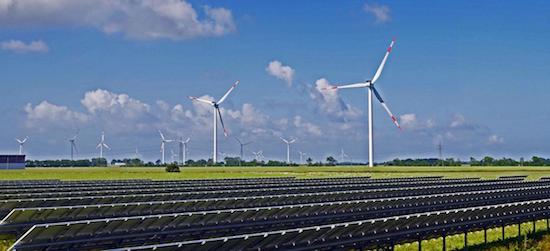The German energy transition continues to gather pace, reaching a record 47 per cent of total electricity produced in the first five months of 2019, putting it well ahead of its target for 2025, which requires it to meet between 40 and 45 per cent of total electricity consumption from renewables.
The achievement for the first five months of the calendar year is document by the Fraunhofer Institute, a leading renewable energy research organisation, which runs a detailed tally of electricity production and consumption in Germany.
As Fraunhofer’s Bruno Burger notes, each month of 2019 has so far delivered at least a 40 per cent renewable share, with May coming in at a 50.7 per cent share, and the total for the first five months at 46.8 per cent. The lowest month for renewables share was February, with 40.2 per cent.
 As this table notes, the biggest contributor over the first five months of the year was wind energy, which accounted for more than 26 per cent of the electricity produced in Germany over the first five months of the year.
As this table notes, the biggest contributor over the first five months of the year was wind energy, which accounted for more than 26 per cent of the electricity produced in Germany over the first five months of the year.
What’s interesting is the change between this year and last year. Burger says wind is up 18.7 per cent, or 9.45TWh, while solar is down 4.8 per cent, and nuclear output is up 3.8 per cent.
 But the biggest falls came in coal – with lignite (brown coal) falling 17.1 per cent, or 9.48TWh (about the same amount that wind increased), while hard coal (black coal) was down 22.4 per cent.
But the biggest falls came in coal – with lignite (brown coal) falling 17.1 per cent, or 9.48TWh (about the same amount that wind increased), while hard coal (black coal) was down 22.4 per cent.
This led to an equivalent fall in emissions et public electricity generation in Germany from January to May 2019 compared to January to May 2018: Wind: +9.45 TWh (+18.7%) Solar: -0.85 TWh (-4.8%) Nuclear: +1.11 TWh (+3.8%) Lignite: -9.48 TWh (-17.1%) Hard coal: -6.81 TWh (-22.4%) Natural gas: +1.87 TWh (+9.9%)
Germany has a target of 40-45 per cent renewable share of gross electricity consumption by 2025 and 60-65 per cent by 2030.










